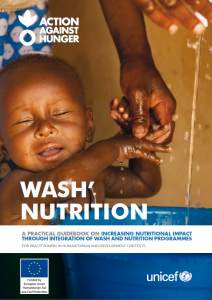
A practical guidebook on increasing nutritional impact through integration of WASH and Nutrition programmes. It is meant for practitioners in humanitarian and development contexts.
Tags: Capacity Building, Child Friendly Facilities, Cross Cutting, Excreta Management, Human Right to Water / Sanitation, Hygiene Promotion, Protection, Solid Waste Management, WASH Assessments, WASH Coordination, WASH Monitoring, WASH Programme Health and Safety, WASH Strategy Development, and Water Supply. Locations: Africa, Asia and the Pacific, Central Asia, Europe, Middle East, and South-West Asia. Languages: English. Organisations: ACF and UNICEF. Categories: WASH Policy Guidelines and WASH Reference Documents.
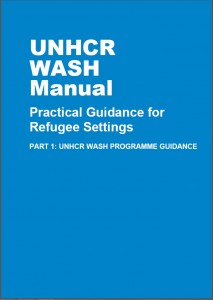
The UNHCR WASH Manual Part 1: Programme Guidance, provides practical guidance for WASH programmes in refugee settings.
Tags: Camp Closure, camp management, Capacity Building, CASH Interventions, Child Friendly Facilities, Cold Climates, Cross Cutting, Disability, Environment, Gender, Gender Based Violence, Human Right to Water / Sanitation, Protection, Value for Money, WASH Assessments, WASH Coordination, WASH Monitoring, WASH Programme Health and Safety, WASH Programme Management, WASH Reporting, and WASH Strategy Development. Languages: English. Organisations: UNHCR. Categories: WASH Manual, WASH Operational Guidelines, WASH Policy Guidelines, and WASH Reference Documents.
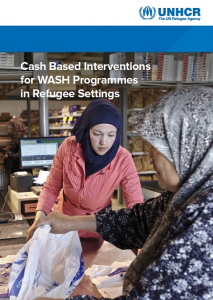
This report is based on a desk-based review of secondary data, comprising published material as well as grey literature, supplemented with key informant interviews for programmes that lacked documentation. Section One summarises the current use of CBI in WASH programming. Section Two summarises the best practices and lessons learned including challenges faced, drawing on evidence from the project examples found. Section Three provides recommendations and best practice guidance for use of CBI in refugee settings. Section Four details existing tools and guidance.
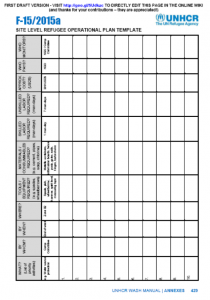
This template can be used to help UNHCR and WASH actors establish a simple WASH operational plan (WHO will do WHAT, WHERE, WHEN, and HOW and WHO will PAY and WHO will MONITOR). This template can be used in addition to the site level WASH Strategy Template.
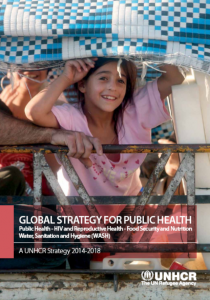
This document describes UNHCR’s global strategy for public health through a set of guiding principles and strategic approaches including protection; age, gender and diversity; equity; access; sustainability; community empowerment; appropriateness and reliability; partnerships and coordination; capacity building; communication and advocacy; integrated approaches; measurement and monitoring; and innovation. The document describes strategic objectives and enabling actions per sub-sector (Public Health, HIV and Reproductive Health, Food Security and Nutrition, and WASH).
Tags: Capacity Building, Disease Vector Control, Excreta Management, Gender, Gender Based Violence, Human Right to Water / Sanitation, Hygiene Promotion, Protection, Public Health, Value for Money, WASH Coordination, WASH Monitoring, WASH Strategy Development, and Water Supply. Languages: English. Organisations: UNHCR. Categories: WASH Guidelines, WASH Operational Guidelines, WASH Policy Guidelines, and WASH Reference Documents.
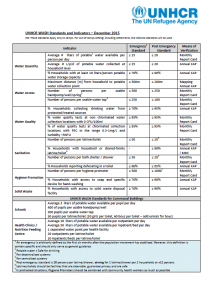
A summary of UNHCR water, excreta management, solid waste management, disease vector control and hygiene promotion standards and indicators for emergency and post emergency refugee settings including means of verification.
Tags: Bathing Facilities, Disease Vector Control, Drainage, Excreta Management, Handwashing with Soap, Hygiene Promotion, Solid Waste Management, WASH Assessments, WASH Monitoring, WASH Strategy Development, Water Quality Testing and Surveillance, and Water Supply. Languages: English. Organisations: UNHCR. Categories: WASH Indicators and Standards.
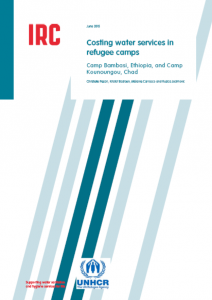
This report applies the life-cycle costs approach (LCCA) to the provision of water services in two UN refugee camps, Bambasi in Ethiopia and Kounoungou in Chad. It is based on cost data from financial reports in Geneva and both camps and on service-level data collected through the UNHCR monitoring system and on site through water point surveys.
The purpose of the study was (1) to better understand the structure, magnitude and drivers of the cost of providing a targeted level of water service to refugees, and (2) to reflect on the applicability of LCCA in the UNHCR monitoring framework and the potential for implementing it in systematically.
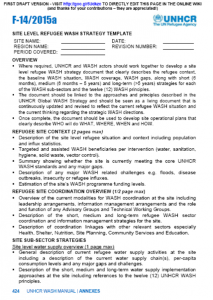
Where required, UNHCR and WASH actors should work together to develop a site level refugee WASH strategy document that clearly describes the refugee context, the baseline WASH situation, WASH coverage, WASH gaps, along with short (6 months), medium (6 months – 5 years) and long-term (>5 years) strategies for each of the WASH sub-sectors and the twelve (12) WASH principles. This template can be used to help produce the site level WASH Strategy.
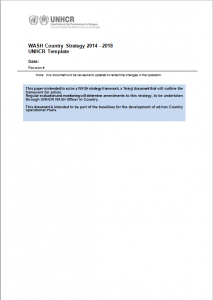
Where required, UNHCR and WASH actors should work together to develop a country level refugee WASH strategy document that clearly describes the refugee context, the baseline WASH situation, WASH coverage, WASH gaps, along with short (6 months), medium (6 months – 5 years) and long-term (>5 years) strategies for each of the WASH sub-sectors and the twelve (12) WASH principles. This template can be used to help produce the Country level WASH Strategy.
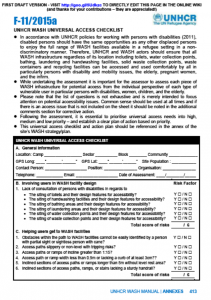
This document has been designed to help UNHCR and WASH actors assess WASH infrastructure for potential access from the individual perspective of each type of vulnerable user in particular persons with disabilities, women, children, and the elderly.
Tags: Bathing Facilities, Communal Toilets, Cross Cutting, Disability, Laundering Facilities, WASH Assessments, WASH Monitoring, WASH Programme Management, WASH Strategy Development, and Water Supply. Languages: English. Organisations: UNHCR. Categories: WASH Blank Forms, WASH Operational Guidelines, WASH Policy Guidelines, and WASH Reference Documents.
 English
English










